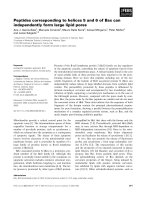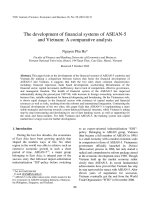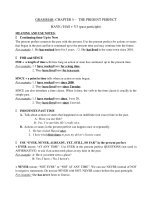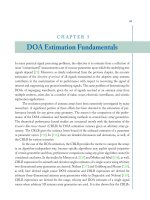Applying career development theory to counseling, 6e chapter 5 and 6
Bạn đang xem bản rút gọn của tài liệu. Xem và tải ngay bản đầy đủ của tài liệu tại đây (73.15 KB, 16 trang )
Chapter 5
HOLLAND’S THEORY OF TYPES
Step 1
Gaining Self - Understanding
Assess a person’s ability, interests, values, and personality by examining six types.
Realistic
Investigative
Conventional
Artistic
Enterprising
COPYRIGHT © 2014 Brooks/Cole*Wadsworth Publishing Company A division of Cengage Inc.
Social
1
HOLLAND’S THEORY OF TYPES
Step 2
Obtaining Knowledge about the World of Work
Holland’s six categories provide a means for classifying and learning about occupations (the environment).
Realistic
Investigative
Conventional
Artistic
Enterprising
COPYRIGHT © 2014 Brooks/Cole*Wadsworth Publishing Company A division of Cengage Inc.
Social
2
HOLLAND’S THEORY OF TYPES
Step 3
Integrating Information about Self and the World of Work
Person
R
Environment
I
R
I
Environment
C
A
E
C
S
A
E
S
Use the information about self and environment to
facilitate a match between the two.
COPYRIGHT © 2014 Brooks/Cole*Wadsworth Publishing Company A division of Cengage Inc.
3
HOLLAND’S THEORY OF TYPES
Example of High and Low Congruence
High Congruence
Person
Environment
High
Low
S
I
A
E
C
R
S
I
Low Congruence
Person
A
C
E
R
Environment
High
Low
I
S
A
C
R
E
COPYRIGHT © 2014 Brooks/Cole*Wadsworth Publishing Company A division of Cengage Inc.
R
C
A
S
I
E
4
HOLLAND’S THEORY OF TYPES
Example of High and Low Differentiation
High Differentiation
High
Low
E
S
C
I
A
R
Low Differentiation
High
Low
E
S
COPYRIGHT © 2014 Brooks/Cole*Wadsworth Publishing Company A division of Cengage Inc.
C
I
A
R
5
HOLLAND’S THEORY OF TYPES
Consistency
Identify the Holland types that are consistent with
each other and inconsistent with each other.
Realistic
Investigative
Conventional
Artistic
Enterprising
COPYRIGHT © 2014 Brooks/Cole*Wadsworth Publishing Company A division of Cengage Inc.
Social
6
HOLLAND’S THEORY OF TYPES
Identity
Clear
Diffuse
Stable
Unstable
Articulate career plans
Contingency plans
Unable to state career plans
Knowledge of self
No contingency plans
Knowledge of work
Job search strategies
Little knowledge of self
Little knowledge of work
Few job search strategies
COPYRIGHT © 2014 Brooks/Cole*Wadsworth Publishing Company A division of Cengage Inc.
7
RESEARCH ON HOLLAND’S CONCEPTS
Congruence
Holland’s types and other constructs
Consistency
Vocational identity
COPYRIGHT © 2014 Brooks/Cole*Wadsworth Publishing Company A division of Cengage Inc.
8
HOLLAND’S THEORY
OCCUPATIONAL INFORMATION
The Occupation Finder
The Education Finder
The Dictionary of Holland Occupational Codes
COPYRIGHT © 2014 Brooks/Cole*Wadsworth Publishing Company A division of Cengage Inc.
9
HOLLAND’S THEORY
ASSESSMENT INSTRUMENTS
Vocational Preference Inventory
Self-Directed Search
Career Attitudes and Strategies Inventory
Position Classification Inventory
Environmental Identity Scale
My Vocational Situation
COPYRIGHT © 2014 Brooks/Cole*Wadsworth Publishing Company A division of Cengage Inc.
10
MYERS-BRIGGS TYPE THEORY
Chapter 6
Step 1: Gaining Self-Understanding
Aptitudes
(Scholastic Assessment Test)
(ACT Tests)
(Differential Aptitude Tests)
(General Aptitude Test Battery)
(Armed Services Vocational Aptitude Test
Battery)
Achievement
(Specific Occupations)
Interests
(Kuder Career Search)
(Strong Interest Inventory)
(California Occupational Preference Survey)
Values
(Study of Values)
(Values Scale)
Personality
MYERS-BRIGGS TYPE INDICATOR
COPYRIGHT © 2014 Brooks/Cole*Wadsworth Publishing Company A division of Cengage Inc.
11
MYERS-BRIGGS TYPE THEORY
PREFERENCE PATTERNS
Perceiving
(Perceive an idea)
Judging
(make a decision about an idea)
Aware of. Recognize. Descern
Sensing
Thinking
(Taking information in
(Analyzing and being objective)
through hearing and seeing)
Intuition
(Indirect, adds ideas
to perceptions)
Feeling
(Subjective reaction, may be
related to one’s values)
COPYRIGHT © 2014 Brooks/Cole*Wadsworth Publishing Company A division of Cengage Inc.
12
MYERS-BRIGGS TYPE THEORY
FOUR LETTER CODE
Way of Viewing
Preferred
the World
Perceiving
Judging
Mode
Extravert
Sensing
Thinking
Judging
Intuition
Feeling
Perceiving
(Take action and
deal with people
and objects)
Introvert
(Inner world,
enjoy contemplating)
COPYRIGHT © 2014 Brooks/Cole*Wadsworth Publishing Company A division of Cengage Inc.
13
MYERS-BRIGGS TYPE PREFERENCES
AND WORK SITUATIONS
Describe work situations or activities that fit each preference type.
Extraversion
Introversion
Sensing
Intuition
Thinking
Feeling
Judging
Perceiving
COPYRIGHT © 2014 Brooks/Cole*Wadsworth Publishing Company A division of Cengage Inc.
14
MYERS-BRIGGS TYPE THEORY
The 16 Myers- Briggs Types
ISTJ
ISFJ
INFJ
INTJ
ISTP
ISFP
INFP
INTP
ESTP
ESFP
ENFP
ENTP
ESTJ
ESFJ
ENFJ
ENTJ
COPYRIGHT © 2014 Brooks/Cole*Wadsworth Publishing Company A division of Cengage Inc.
15
MYERS-BRIGGS TYPE THEORY
Falsification of type (Environmental influences can
cause individuals not to
behave like their true type)
Women
Culturally diverse populations
COPYRIGHT © 2014 Brooks/Cole*Wadsworth Publishing Company A division of Cengage Inc.
16









